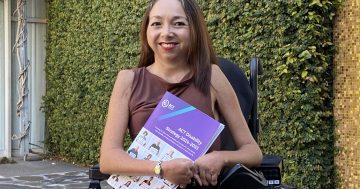Viki Chinn* reflects on the challenges faced as a disabled colleague and individual in a time where COVID-19 has changed the way we work and collaborate.
 I wonder what I would have said if someone had told me four months ago that there would be a time when I would be able to work from the relative comfort of my own home without having to navigate the tube on a twice daily basis.
I wonder what I would have said if someone had told me four months ago that there would be a time when I would be able to work from the relative comfort of my own home without having to navigate the tube on a twice daily basis.
That I would be able to get up, turn my computer on and start work without rushing anywhere.
I wonder how that would have looked to me…then.
As someone who has worked from home, initially one day a week and more recently two, as a reasonable adjustment to help me manage the effects of my disability and allow me to work to the best of my ability I have always massively valued my work from home days.
Having lost my hearing during my time at university I am now profoundly deaf and rely on a combination of lipreading, interpretation of sound, and piecing together of context to follow and understand what is going on around me.
This is, quite simply, exhausting.
By the end of each and every day my eyes are tired, sore, and heavy, my brain’s cognitive function ability is significantly lowered, my tinnitus – the noise that sings its merry tune inside my ears 24/7 – blasts away as the more tired I am the harder it is to direct focus away from it, and my ability to balance is impaired placing physical strain on my whole body as my muscles work extra hard to keep me upright and stop me from walking into things!
My work from home days have always allowed me to get the physical rest I need to manage my ‘outside communication’ days better and allow me to work quietly without distraction as I cannot tune out environmental distractions in the way that others can.
They also, when time allows, give me the chance to go over transcripts of previous interactions or slides of forthcoming presentations to try and fill information gaps I have.
In order to retain information I need to immerse myself in it, fully focus and process it without any conflicting sensory interruptions.
My work from home days allow me to do this.
So, if working from home two days a week works so well surely five days a week can only make things even easier, right?
Or at least that’s probably what I would have thought….then.
Well! What a learning curve the past few months have been.
The biggest thing I have learnt so far is that this is precisely what it is. A learning curve.
I have always taken pride in my expertise in the field of disability and recruitment/workplace adjustments.
I take great pleasure in helping the students I work with understand and get the adjustments they need.
I am a firm believer in the Social model of disability and genuinely think that with the right adjustments and a supportive employer anything is possible.
I still believe that. I have, however, learnt that working from home full time is a whole new ball game.
One that has pro’s and cons.
Adapting to new technologies, many of which fail abysmally on the accessibility front, dealing with technical hiccups whilst struggling to access the information needed to resolve them quickly, experiencing extreme screen fatigue and increased screen exposure, not only due to increased interactions but also due to my need to spend more time than my counterparts having to go over information and learning that I haven’t been able to process instantly, working late into the evening simply to try and keep up, and experiencing the physical effects from having done so, have all exacerbated an already difficult situation.
On a positive note not having to commute is undoubtedly a huge benefit of working from home along with the ability to manage my work environment to minimise noise and distraction.
Meetings are now filled with colleagues politely waiting their turn to speak rather than speaking over each other.
Realising that I have mastered skills that I never would have used otherwise, overcoming hurdles I never would have previously considered, and having far more substantial one to one conversations with colleagues I barely interacted with before are all definite positives of full time working from home.
I had planned to write this outlining some of the technological issues I’ve faced but to be honest, most people are facing them too.
Whether you are working from home on a job, a recruitment process, or on your studies I have no doubt we share similar anxieties about poor internet connection, about screen fatigue and the constant overload of virtual communications.
We share a conflict of feeling isolated yet overwhelmed with contact.
Disconnected but overly connected.
Having less options for doing things yet feeling busier than ever.
Worry about what the future will hold. I don’t need to tell you this.
There are of course additional issues for those of us who live with disability.
Poor internet connection, bad communication practices, low quality technology, and substandard captions turn a video conversation from difficult for everyone to downright impossible for a deaf person (and those with other disabilities too).
It’s like being asked to complete a jigsaw with most of the pieces missing.
At the end of the day we can only look at one thing at a time-our eyes are our ears and we only have one set.
I emphasise the importance of working for an inclusive employer as being key to a disabled person being able to thrive and flourish in the workplace.
Having a good inclusive employer and working together to achieve success is important at the best of times. It is vital in the current situation.
*Viki Chinn is a Careers Consultant with LSE Careers at the London School of Economics.
This article first appeared at blogs.lse.ac.uk











